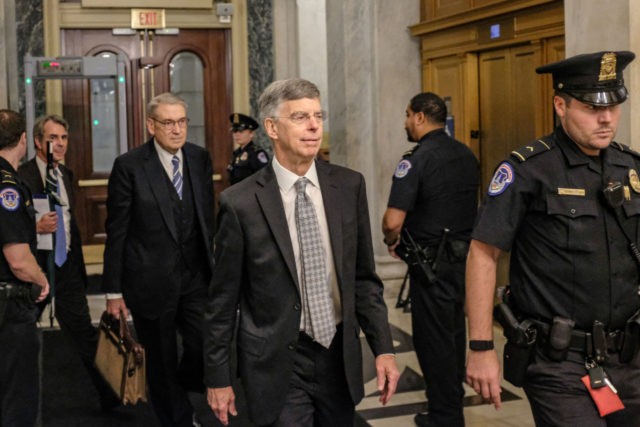U.S. diplomat Bill Taylor told impeachment investigators last month that Ukraine did not know the U.S. had temporarily frozen aid at the time of the July 25 phone call, making quid pro quo impossible, transcripts released Wednesday revealed.
Taylor’s October 22 depostion behind closed doors suggests Trump did not threaten to withhold aid during the infamous July 25 call between him and his Ukrainian counterpart Volodymyr Zelensky that ultimately triggered the impeachment inquiry.
“July 25th is a week after the hold was put on the security assistance. And [on] July 25th, they had a conversation between the two presidents, where it was not discussed,” Taylor declared under questioning from Rep. John Ratcliffe (R-TX).
Ratcliffe then asked, “To your knowledge, nobody in the Ukrainian Government was aware of the hold?”
“That is correct,” Taylor replied.
Ukraine did not find out there was a hold on U.S. aid until over a month after the call, Taylor testified. The U.S. ultimately released the aid on September 11 without Ukraine having to do anything as part the alleged quid pro quo.
Ratcliffe explained to Taylor:
So the idea of a quid pro quo is a concept where there is a demand for action or an attempt to influence action in exchange for something else. And in this case, when people are talking about a quid pro quo, that something else is military aid.
So, if nobody in the Ukrainian Government is aware of a military hold at the time of the Trump-Zelensky call, then, as a matter of law and as a matter of fact, there can be no quid pro quo, based on military aid.
Taylor did not dispute Ratcliffe’s explanation of a qui pro quo, acknowledging that he is not a lawyer.
The Ukraine ambassador was not even on the July 25 call at the center of the impeachment probe.
Citing Ratcliffe, President Donald Trump tweeted on October 23, “Neither he [Taylor] or any other witness has provided testimony that the Ukrainians were aware that military aid was being withheld. You can’t have a quid pro quo with no quo.”
House Democrats pursuing the impeachment inquiry are trying to determine if Trump abused his power by allegedly coercing Ukraine during the call to investigate corruption allegations against Joe Biden and his son Hunter in exchange for aid.
Trump, Zelensky, and some impeachment inquiry witnesses have denied the existence of a quid pro quo. Meanwhile, however, other impeachment probe witnesses, including Taylor, have presumed that a quid pro quo did take place, citing second-hand information.
Ratcliffe asked Taylor during his deposition, “Based on your knowledge, nobody in the Ukrainian Government became aware of a hold on military aid until two days later, on August 29th.”
“That’s my understanding,” Taylor replied.
Taylor’s concerns of a quid pro quo stem from conversations with other Trump administration officials, not the July 25 call.
There are no transcripts of those conversations to confirm or contradict Taylor’s characterization of what was said.
In a complaint filed August 12, a “whistleblower” accused Trump of making a quid pro quo offer to Zelensky on July 25 in which the U.S. president pressured his Ukrainian counterpart to launch a probe into the Bidens in exchange for aid.
Hunter and Joe Biden have denied any wrongdoing.
Although the complaint is at the heart of the impeachment inquiry, there are signs House Democrats are trying to move beyond the July 25 call on Ukraine.

COMMENTS
Please let us know if you're having issues with commenting.